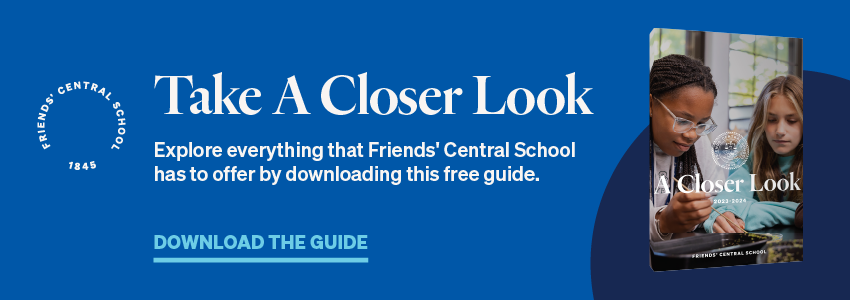
Being a parent in today’s world is more complicated than ever. Raising children while considering the rise of social media, peer pressure, and climate change concerns can make parenting a daunting task—and the global pandemic only heightened this level of uncertainty and disruption.
For two years, families were forced to stay at home, outside of children’s daily routine and personal connections provided by their school and extracurricular activities. Now that we are a few years from those initial, uncertain months, parents are starting to feel the relief of the world finding an equilibrium. And while we are still grappling with the pandemic and working hard to put it in our rearview mirror, our children are trying to find ways to reacclimate to their academic, social, and emotional worlds at school.
Free Downloadable Guide: Take a Closer Look at Friends' Central School
Parents hoping to support their child as life returns to a “new normal,” are trying to find new ways to rekindle lost relationships and manage the burnout and fatigue caused by an impending need to “catch up.” However, common barriers—such as learning and emotional learning loss—have made this process challenging.
What is Learning Loss?
One of the most common concerns parents have in the post-lockdown world is the idea that their child has experienced learning loss. Despite the large number of articles and news stories that insist learning loss is an urgent educational issue, parents shouldn’t feel the need to panic. Beyond its prevalence among young children across the country, many publications are alarmists on this topic.
“Learning loss,” at its core, means a student hasn’t made as much progress over the past few years as one would expect for their age or grade level. In many ways, this can be said of nearly every young learner today in one area or another. With this in mind, it’s important to remember that while the idea of regression may be a daunting one, parents are not alone.
The Impact of Learning Loss
It’s no surprise to parents, caregivers, and educators that remote learning was the cause of some form of learning loss in many children. Whether it was ineffective in nature or not conducive to childrens’ learning styles, many parents felt the negative effects of remote learning. The swift adjustment to remote learning was nothing short of herculean, but it simply could not replace in-person classroom learning.
In fact, teachers across the United States rated the effectiveness of their schools’ remote learning as only a 3.5 out of 10. That ineffectiveness is now reflected in the progress and performance of many young learners. According to a study by Brown University, math scores fell significantly for children between 2019 and 2021. And a further study by McKinsey & Company found that on average, students lost approximately three months of learning in math, and one and a half months learning in reading during their time with remote learning.
While these statistics may seem dire, it’s important to remember that loss of learning is found across the board and it’s a reality educators are tackling together. While it’s important to support children’s academic journey, the more immediate focus may need to be the emotional effect the pandemic has on young learners and the impact it has on learning today.
Emotional Loss During the Pandemic
The emotional toll the pandemic had on people around the world can’t be overstated. As a parent, you’re likely still grappling with the effects it had on your own life. Many have experienced loss of:
- Members of their communities
- Connections with others
- Loved ones
- Careers
- Freedom and autonomy
Add to this the omnipresent fear of the virus itself, and the anxiety involved in trying to keep ourselves, and our families, healthy. Unsurprisingly, our children were not immune to this emotional toll.
They have experienced their own level of fear and uncertainty from these disruptions to typical family life. And since most young people find connection through school-related activities, many have struggled to find steady footing in social situations after being isolated at home for so long. This preoccupation with anxiety has reduced children’s mental bandwidth to retain new information and focus in various academic settings. As a result, this loss of focus has been one of the leading causes of learning loss.
Repairing Emotional and Learning Loss
Again, it’s important to remember that just as the pandemic affected everyone around the world, nearly every student has experienced some type of emotional and learning loss over the past few years. And while this may seem scary, this challenge provides an opportunity for parents, caregivers, and educators to focus on supporting young learners where and how they need it most.
Don’t Over-Focus on Learning Loss
In the face of learning loss, the instinct is often to focus on getting a child up to speed as quickly as possible. It’s important, however, to give them the space and understanding to work through the emotional challenges they’re experiencing without pressuring them to catch up too fast. Remember, learning loss is only one element in your child’s multifaceted social and educational life. Don’t lose sight of the areas they’re thriving in because these small victories can make a huge difference in a child’s progress.
Prioritizing Mental Health is Imperative
Perhaps the best way to tackle learning and emotional loss is to prioritize young learners’ mental health. Teachers and parents should give children the time needed to feel comfortable back at school—and in the world. Parents, caregivers, and teachers should ensure they are working to understand each child’s particular needs and challenges.
Addressing mental health concerns such as grief, depression, and anxiety doesn’t need to be complicated. Simple actions can ensure children feel their mental health is taken seriously:
- Understanding and acknowledging common symptoms and behaviors of emotional loss and mental health struggles
- Discussing challenges and struggles in simple, but honest terms
- Listening without judgment
- Normalizing feelings of grief
- Helping children connect with support groups
You should also feel encouraged to help your child connect with the additional support available to them. Consider yourself a partner with the counselors and support staff at your child’s school. Together, you can help your young learner thrive.
Establish a Routine
Children find routine and consistency stabilizing. As children get back to their pre-pandemic lives of school, extracurriculars, and social activities, it’s important to re-establish the routines they thrived on before the pandemic. Adults can reintroduce and prioritize those habits and routines that bring children joy, and help reignite their enthusiasm for life.
Have Open Conversations
It’s important to maintain open and honest dialogue with children about what they’ve experienced and how they’re feeling. Adults should ensure they’re being truthful with their children while making them feel safe, cared for, and acknowledged. Some tactics parents can use are:
- Be honest and keep your conversation appropriate for your child’s maturity level and scope of knowledge
- Stick to facts and use reputable resources for your conversation
- Make sure they know you’re always available to listen
- Be prepared to model the healthy habits and behaviors you want to see in your child
- Have them be aware of who is in their support system and encourage them to connect with others for help if needed
Help Your Child Reacclimate
Helping your child reacclimate to the post-pandemic world is an important step in reigniting their love of learning. It’s imperative to acknowledge the events of the past few years and how they will shape their “new normal.” Helping them focus on the elements of life within their control can help empower them to move forward. Try to encourage them to take small steps to re-enter those healthy routines and activities to ensure it’s a gentle and successful process.
How Independent Schools Combat Emotional and Learning Loss
As with so many elements of raising happy and healthy children, parents should remember that they have a support system available to them as well. Your child’s school and educators should act as partners with you in tackling learning and emotional loss.
Independent schools, like Friends’ Central School, are well-equipped to address education concerns in the post-pandemic world. Since we craft our own curriculum, independent schools have a more agile curriculum and can adjust offerings based on our current student body. At Friends’ Central School, our smaller class sizes are invaluable in combating learning and emotional loss because our teachers and staff are able to get a true sense of each child’s unique needs, and offer personal, individualized support to our young learners.
With all of this support, parents don’t need to jump to any frightening conclusions. Learning loss has become a reality in most children's busy and vibrant post-pandemic life. Parents and educators who truly listen to their young learners and focus on supporting them through the changes and healing process ahead can help children rediscover their love of learning.




